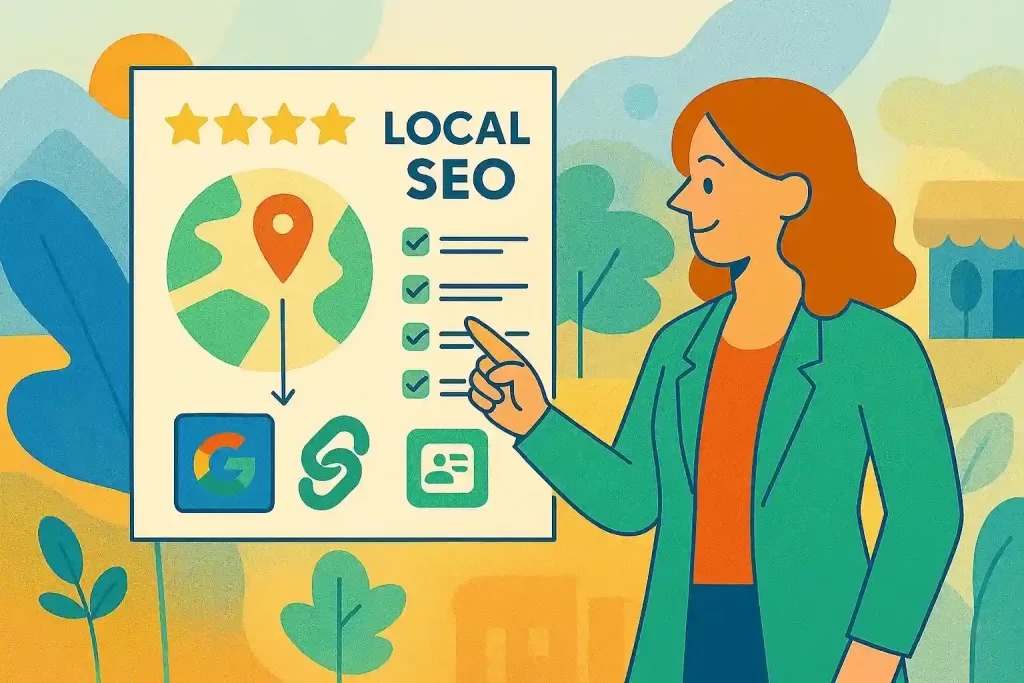Stop Losing Customers: Your Guide to Local Search Success
If you run a local business, you need customers in your area. However, getting found online is the first step. Local SEO Strategies for Small Businesses help you appear when people nearby search for what you offer. This guide gives you a clear path to attract those local customers.

1. Google Business Profile: Your Small Businesses’ Digital Front Door
Your Google Business Profile (GBP), formerly Google My Business (GMB), is your most important tool. It is what shows up in Google Maps and the local 3-pack list. Therefore, you must set it up right.
- Claim and Verify: First, claim your profile and verify your location.
- Complete Everything: Fill in 100% of the fields. This includes your hours, services, and a clear business description.
- Use Keywords in Description: Include local keywords like “Digital Marketing Services Ahmedabad” in your profile description naturally. For example, “We offer top-rated [Service] in [City].”
- Post Updates Weekly: Share news, special offers, and events. This keeps your profile fresh and active.
2. Master Local Keyword Research Strategies for Small Businesses
You need to know the exact words your local customers use. This is different from national SEO.
Actionable Steps:
- Think ‘Near Me’: Focus on keywords that include your city or neighborhood. For instance, instead of “plumber,” use “plumber near me” or “best plumber in Ahmedabad.”
- Find Service + Location: Research phrases like “best bakery + [City]” or “SEO services + [City/Area].”
- Use Free Tools: Use Google’s Keyword Planner or search results to see what people type. Furthermore, look at your competitors’ websites for ideas.
3. Local Citations and Consistency (NAP) Strategies for Small Businesses SEO
A citation is any place online that lists your business information. It must be correct everywhere. Consistency builds trust with Google.
- NAP Check: Your Name, Address, and Phone number (NAP) must be exactly the same on every site. Any small difference can hurt your ranking.
- Build Core Citations: List your business on key sites like Yelp, Justdial, and relevant local directories. Always check for industry-specific directories.
- Fix Old Listings: If you have moved or changed your number, fix all the old listings immediately. This is because incorrect data confuses both customers and Google.
4. Earn and Manage Online Reviews for your Small Business
Reviews are the single biggest factor in local search trust. They boost your ranking and convince customers to call you.
Actionable Steps:
- Ask for Reviews: After every completed service, send a simple text or email asking for a Google review link. Make it easy for them to leave feedback.
- Respond to All Reviews: Thank customers for good reviews. Crucially, respond to bad reviews quickly and politely to show you care. This shows professionalism.
- Never Fake Reviews: Faking reviews can get you banned from Google. Always focus on earning real feedback.
5. Local Link Building and Website SEO
Your website needs to be strong too. Building links from other local sites boosts your authority.
Actionable Steps:
- Local Link Building: Get links from local partners, suppliers, or community websites. For example, sponsor a local team or event.
- Local Landing Pages: If you serve many cities, create a separate page for each one (e.g., “Our Services in Ahmedabad”). This is key for attracting customers in specific areas.
- Technical Basics of Website: Finally, ensure your website loads fast, works well on phones, and uses an SSL certificate (HTTPS).
Local SEO Strategies Checklist For Small Businesses
| SEO Task | Why It Matters |
|---|---|
| Set up Google Search Console | Helps Google crawl and index your site |
| Submit XML sitemap | Makes it easier for search engines to understand your site structure |
| Set up Google Analytics | Tracks user behavior and performance |
| Conduct keyword research (long-tail & local) | Targets what your audience is actually searching for |
| Optimize title tags and meta descriptions | Improves CTR and relevance in SERPs |
| Use keyword-rich headers (H1, H2, etc.) | Boosts scannability and keyword targeting |
| Write unique content for every page | Prevents duplicate content penalties |
| Add image alt text with keywords | Improves accessibility and helps SEO |
| Ensure fast load speed (under 3s) | Affects rankings and user experience |
| Use mobile-friendly design | More than 60% of users are on mobile |
| Fix broken links (404 errors) | Avoids negative SEO signals |
| Use HTTPS (SSL certificate) | Secures your site and builds trust |
| Implement schema markup | Enhances visibility in rich results |
| Claim & optimize Google My Business | Improves local visibility in search/maps |
| Get listed in local directories | Increases chances of showing in local search |
| Encourage and respond to reviews | Builds trust and improves local SEO |
| Create location-specific landing pages | Boosts rankings for local search terms |
| Publish blog content regularly | Drives traffic and builds authority |
| Build internal links between pages | Distributes page authority across your site |
| Acquire high-quality backlinks | Improves domain authority and rankings |
| Track keyword rankings monthly | Helps measure SEO performance |
| Monitor bounce rate and dwell time | Identifies content or UX issues |
| Update outdated content regularly | Keeps your info accurate and fresh |
| Use social sharing buttons | Encourages content sharing and reach |
| Check SEO health with regular audits | Catches SEO issues early and often |
Google Search Operators for Small Businesses
| Search Query | Purpose |
|---|---|
| site:yourwebsite.com | See what’s indexed on Google |
| site:yourwebsite.com “404” | Find error pages |
| filetype:pdf site:yourwebsite.com | Locate PDFs |
| site:yourwebsite.com -intitle:”keyword” -inurl:”keyword” | Detect thin content without keyword targeting |
| link:yourwebsite.com | View backlinks (limited) |
| site:competitor.com | Analyze competitor content |
| intext:”keyword” site:yourwebsite.com | Audit keyword usage in content |
| before:2023-01-01 site:yourwebsite.com | Find outdated pages |
| site:subdomain.yourwebsite.com | Check subdomain indexing |
| inanchor:”keyword” | Check anchor text optimization |
| site:yourwebsite.com inurl:mobile | Find mobile-specific pages |
| site:facebook.com “yourwebsite.com” | Track social mentions |
| site:yourwebsite.com “FAQ” | Locate all FAQ content |
| “404 Not Found” site:yourwebsite.com | Identify thin content |
| site:yourwebsite.com inurl:2020 | Audit old posts |
| “duplicate content example” | Spot content theft |
| “internal link” site:yourwebsite.com | Identify non-indexed pages |
💡 Conclusion: Take Action Today
Local SEO Strategies for Small Businesses are the most cost-effective way to get high-quality customers. You don’t need a massive budget; you just need to follow these steps with consistency. Therefore, start with your Google Business Profile right now.
👉 Need help dominating local search results?
Stop guessing and start winning the local map pack. We specialize in effective SEO Strategies designed for local small businesses like yours.
→ Click Here to Get a Free Local SEO Audit
❓ Frequently Asked Questions (FAQ) for Local SEO Strategies for Small Businesses
What is the most important Local SEO factor for a small business?
Your Google Business Profile (GBP) is the most important factor. Therefore, ensure it is 100% complete, accurate, and actively managed with posts and quick responses to reviews. This is what determines your visibility in local map searches.
What are ‘local citations’ and why do I need them?
A local citation is any online mention of your business NAP (Name, Address, Phone). You need them because they confirm your business information to Google. Consistency across all directories is vital for trust and ranking.
How do I get my small business into the Google 3-Pack?
The 3-Pack is the top three results shown on a map. To get in, you need a fully optimized GBP, a high volume of positive reviews, and strong local keyword matching. Furthermore, being physically close to the searcher helps greatly.
Should I use ‘Digital Marketing Services Ahmedabad’ as a keyword if I am not in Ahmedabad?
No. You should only target locations where you physically serve customers. However, if you serve Ahmedabad from a nearby city, you can create a specific service page for Ahmedabad. Always prioritize keywords that reflect your actual service area.
How often should I ask for customer reviews?
You should ask for reviews after every positive customer interaction. Make it part of your closing process. Regular, fresh reviews are much better than getting a large batch all at once.
















